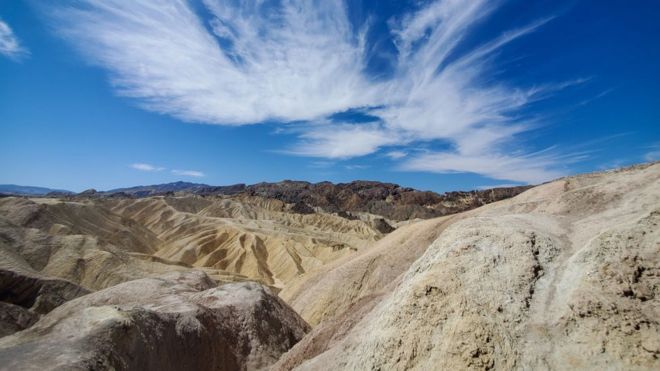What could be the highest temperature ever reliably recorded on Earth - 130F (54.4C) - has been reached in Death Valley National Park in California.
The recording is being verified by the US National Weather Service.
It comes amid a heatwave on the US's west coast, where temperatures are forecast to rise further this week.
The scorching conditions have led to two days of blackouts in California, after a power plant malfunctioned on Saturday.
Sunday's reading was recorded in Furnace Creek in Death Valley.
Before this, the hottest temperature reliably recorded on Earth was 129.2F (54C) - also in Death Valley in 2013.
A higher reading of 134F, or 56.6C a century earlier, also in Death Valley, is disputed.
It is believed by some modern weather experts to have been erroneous, along with several other searing temperatures recorded that summer.
According to a 2016 analysis from weather historian Christopher Burt, other temperatures in the region recorded in 1913 do not corroborate the Death Valley reading.
Another record temperature for the planet - 131F, or 55C - was recorded in Tunisia in 1931, but Mr Burt said this reading, as well as others recorded in Africa during the colonial era, had "serious credibility issues".
The current heatwave stretches from Arizona in the south-west, up the coast to Washington state in the north-west.
It is expected to hit its peak on Monday and Tuesday, before temperatures start to drop later in the week. However, the sweltering heat will continue for at least another 10 days.
As temperatures soared in California, a large "firenado" was observed on Saturday in Lassen County.

California's Independent System Operator (CISO), which manages the state's power, has declared a Stage 3 Emergency, meaning "when demand [for electricity] begins to outpace supply".
Because so much of the region's power relies on solar and wind energy, and because people use their electricity for air conditioning, during heatwaves the power grid becomes strained and is at risk of completely malfunctioning.
In order to manage the state's demand for power and prevent a complete shutdown, officials are using scheduled rolling blackouts to control and conserve energy.
Latest Stories
-
Gold Fields Ghana Foundation challenges graduates to maximize benefits of community apprenticeship programme
60 mins -
GBC accuses Deputy Information Minister Sylvester Tetteh of demolishing its bungalow illegally
1 hour -
Boost for education as government commissions 80 projects
1 hour -
NAPO commissions library to honour Atta-Mills’ memory
2 hours -
OmniBSIC Bank champions health and wellness with thriving community walk
2 hours -
Kora Wearables unveils Neo: The Ultimate Smartwatch for Ghana’s tech-savvy and health-conscious users
2 hours -
NDC supports Dampare’s ‘no guns at polling stations’ directive
2 hours -
Police officer interdicted after video of assault goes viral
2 hours -
KNUST’s Prof. Reginald Annan named first African recipient of World Cancer Research Fund
2 hours -
George Twum-Barimah-Adu pledges inclusive cabinet with Minority and Majority leaders
3 hours -
Labourer jailed 5 years for inflicting cutlass wounds on businessman
3 hours -
Parliament urged to fast-track passage of Road Traffic Amendment Bill
3 hours -
Mr Daniel Kofi Asante aka Electrician
3 hours -
Minerals Commission, Solidaridad unveils forum to tackle child labour in mining sector
3 hours -
Election 2024: Engagement with security services productive – NDC
3 hours

